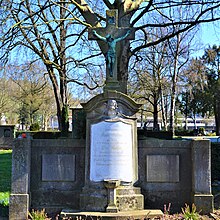Paul Möhler
Paul Anton Möhler (born December 15, 1852 in Gmünd ; † February 1, 1929 there ) was a German politician of the Center Party and long-time Lord Mayor of the city of Gmünd.
Life
After finishing secondary school, Möhler attended the polytechnic and the building trade school in Stuttgart. He then worked in the construction industry in Schwäbisch Hall and Jagstfeld . In 1875 he settled in Gmünd as a building contractor .
Möhler was a member of the citizens' committee and chairman there from 1882 to 1888 . In 1888 Möhler was first elected to the local council and on February 15, 1894 to the town school , after his predecessor Adolph Untersee died unexpectedly in November 1893. On February 25, 1903 he was appointed Lord Mayor.
During his tenure as mayor, the construction of the waterworks and the construction of a municipal sewage treatment plant as well as other infrastructure projects, the acquisition of today's city garden from the Stahl von Pfeilhalde family and the construction of the municipal bathing establishment (1901–1902), as well as the expansion of the town hall . Various steps were taken under Möhler to develop Gmünd as a school town, for example the agricultural winter school and its own commercial school were established in 1898, the secondary school (today Parler-Gymnasium) was built in 1903/04 and a boys' primary school was established in Klösterle in 1909/10 . Möhler accompanied the construction of the new teachers' seminar in Lessingstrasse as well as the construction of the Royal College for the Precious Metals Industry . One of Möhler's achievements was the establishment of the Gmünd-Göppingen railway line . In 1922 he went as Lord Mayor of the town of Gmünd in retirement , after he had been made an honorary citizen already 1919th
In the election for the state constitutional assembly on January 12, 1919, Möhler ran for 33rd place on the state list of the Center Party, but was initially unable to win a mandate as the Center only received 31 seats. On September 23, 1919 Möhler moved up to the state assembly after the originally elected representative, his party colleague Camillus Hepp , resigned from his seat. During his term of office Möhler belonged to the elementary school committee from October 4, 1919 to February 1920, and from February 1920 to the finance committee of the state constitutional assembly. From April 30, 1920 he was also chairman of the committee to consider the draft of a state election law, and since May 5, 1920 chairman of the committee to consider the draft of an official journal law.
On June 6, 1920, Paul Möhler was elected as the top candidate for constituency XI (Gmünd-Schorndorf-Welzheim) in the 1st Landtag of the Free People's State of Württemberg . He was deputy chairman of the finance committee and from July 16, 1921 a member of the special committee for the draft law on the state police administration. On November 4, 1920 he was elected by the state parliament as a deputy member of the Württemberg Criminal Court and confirmed in this function on June 28, 1924 and July 5, 1928.
In December 1901 Möhler was second vice-president at the Catholic Day in Ulm .
Möhler died as a result of a stroke and was buried in the Leonhard Cemetery in Schwäbisch Gmünd.
Awards
- Frederick Order, First Class
- King Karl Jubilee Medal
- Wilhelm Cross
- Honorary Citizen of the City of Gmünd (May 28, 1919)
- Honorary chairman of the Gmünder local branch of the Center Party
literature
- Albert Pflüger : Obituary of the President of the 3rd Württemberg State Parliament in the 17th session of the State Parliament on February 13, 1929, Protocol Volume 1, p. 319 (not viewed) .
- Obituary in Swabian Kronik, (II. Section) from 2/3 February 1929, p. 5 (portrait in the Abendblatt, p. 5) (not viewed) .
- State Gazette for Württemberg, No. 30, Stuttgart 1929 (not viewed) .
- Frank Raberg : Biographical handbook of the Württemberg state parliament members 1815-1933 . On behalf of the Commission for Historical Regional Studies in Baden-Württemberg. Kohlhammer, Stuttgart 2001, ISBN 3-17-016604-2 , p. 572 f .
- Portrait of Paul Möhler (PDF; 21 kB) on gmuender-tagespost.de.
Individual evidence
- ↑ Honor for "forgotten" mayor , in Gmünder Tagespost from September 17th, 2012.
- ↑ "In recognition of his conscientious and loyal management of office for 25 years as well as his many services to the city", so the reasoning according to the Schwäbisch Gmünd city archives, local council minutes of May 19, 1919.
- ↑ Former Lord Mayor Möhler 75 years old! in Rems-Zeitung No. 292 (second sheet) of December 16, 1927, p. 5.
Remarks
- ↑ Hepp took up his mandate only on the premise that the Constituent Assembly would only exist for a few months, and therefore resigned on September 6, 1919.
| personal data | |
|---|---|
| SURNAME | Möhler, Paul |
| ALTERNATIVE NAMES | Möhler, Paul Anton (full name) |
| BRIEF DESCRIPTION | German politician (center) and Lord Mayor of Gmünd |
| DATE OF BIRTH | December 15, 1852 |
| PLACE OF BIRTH | Gmuend |
| DATE OF DEATH | February 1, 1929 |
| Place of death | Gmuend |

